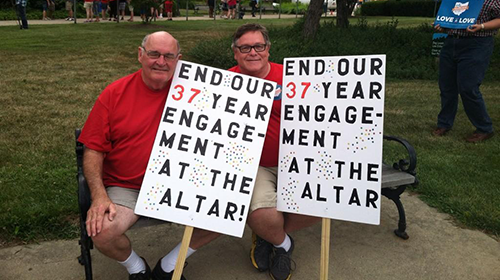The Fight for Marriage Equality: From Birth to Death and Every Moment in Between


After 22 years together, Jim Obergefell and John Arthur faced the devastating reality that John would not survive another year. John had been diagnosed with amyotrophic lateral sclerosis (ALS) in 2011, a condition for which there is no cure.
By June of 2013, when the Supreme Court struck down the Defense of Marriage Act (DOMA) in United States v. Windsor, the couple knew their days together would be measured in weeks, not months or years. With the help of family, friends, and a team of doctors, they boarded a medically equipped plane to Maryland and married on the tarmac of an airport there.
But when they returned home to Ohio – the state that they had called home for decades, where they built a life together and where they prepared to say goodbye to each other – their marriage was not recognized. They faced the cruel reality that when John died, his death certificate would list him as single and a blank space would follow on the line for surviving spouse. The love and legacy he shared with Jim would be noticeably empty from the last official document of his life.
Unable to fathom such a fate, the couple sued the state of Ohio.
In December of 2013, the district court ruled in favor of Jim and John, striking down Ohio's marriage bans as they applied to the recognition of out-of-state marriages on death certificates. The ruling left John's death certificate, which listed him as married and Jim as his spouse pursuant to an earlier order of the court, undisturbed. But the state of Ohio appealed, and now if that decision is overturned, John's death certificate could be amended to remove all mention of Jim and John's 22-year relationship.
The 6th Circuit Court of Appeals, which covers the states of Ohio, Kentucky, Tennessee, and Michigan, will hear argument today in Jim and John's case as well as five other cases challenging state laws that bar the recognition of marriages between same-sex couples and the freedom to marry for same-sex couples.
In the year between when many of these cases were filed and today's oral argument, some plaintiffs like Jim Obergefell have lost the love of their life while others have welcomed a child into the world. For each couple the most joyous and the most tragic of life's moments have been complicated by their home state's refusal to treat them as married or to prevent them from being married in the first instance.
Today, Jim and the plaintiffs in five other cases are calling on the 6th Circuit to affirm six district court decisions all ruling in favor of marriage or marriage recognition for same-sex couples in Ohio, Tennessee, Kentucky and Michigan.
These cases will be the third set of cases to be heard by a federal court of appeals after a string of 21 district court decisions, which all ruled in favor of marriage equality since the Supreme Court's decision in Windsor. The two other courts of appeals, the 10th Circuit and the 4th Circuit, have already upheld district court decisions on the side of marriage. We hope that the 6th Circuit will be next.
The ACLU continues to work to strengthen the unbroken line of post-Windsor decisions that has created a judicial consensus that bans on the freedom to marry and marriage recognition for same-sex couples are unconstitutional. One or more of these cases will soon be before the Supreme Court and we are optimistic that the Supreme Court will also conclude that our Constitution simply does not tolerate the discrimination that these marriage bans reflect.
With any luck that day will come soon so that Jim, the other plaintiff couples, and same-sex couples across the country will be able to navigate life's challenges and celebrations without having to worry about whether they will be treated as strangers in the eyes of the law.
Learn more about marriage equality and other civil liberties issues: Sign up for breaking news alerts, follow us on Twitter, and like us on Facebook.
Stay informed
Sign up to be the first to hear about how to take action.
By completing this form, I agree to receive occasional emails per the terms of the ACLU's privacy statement.
By completing this form, I agree to receive occasional emails per the terms of the ACLU's privacy statement.

